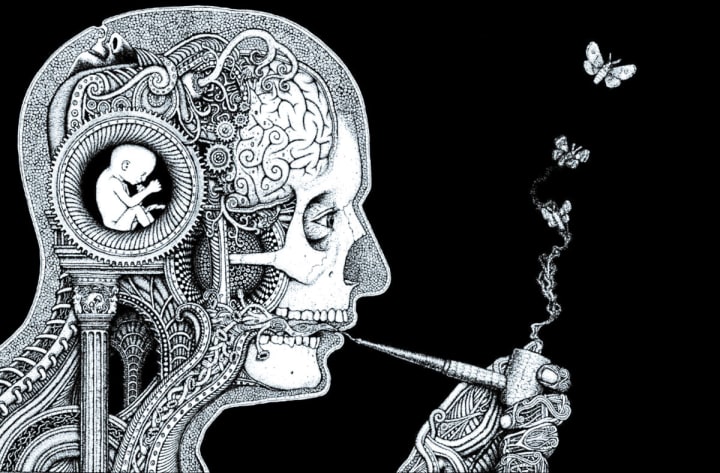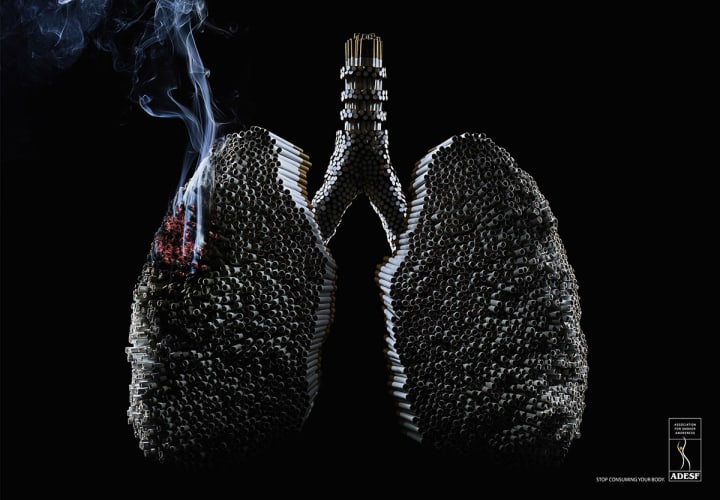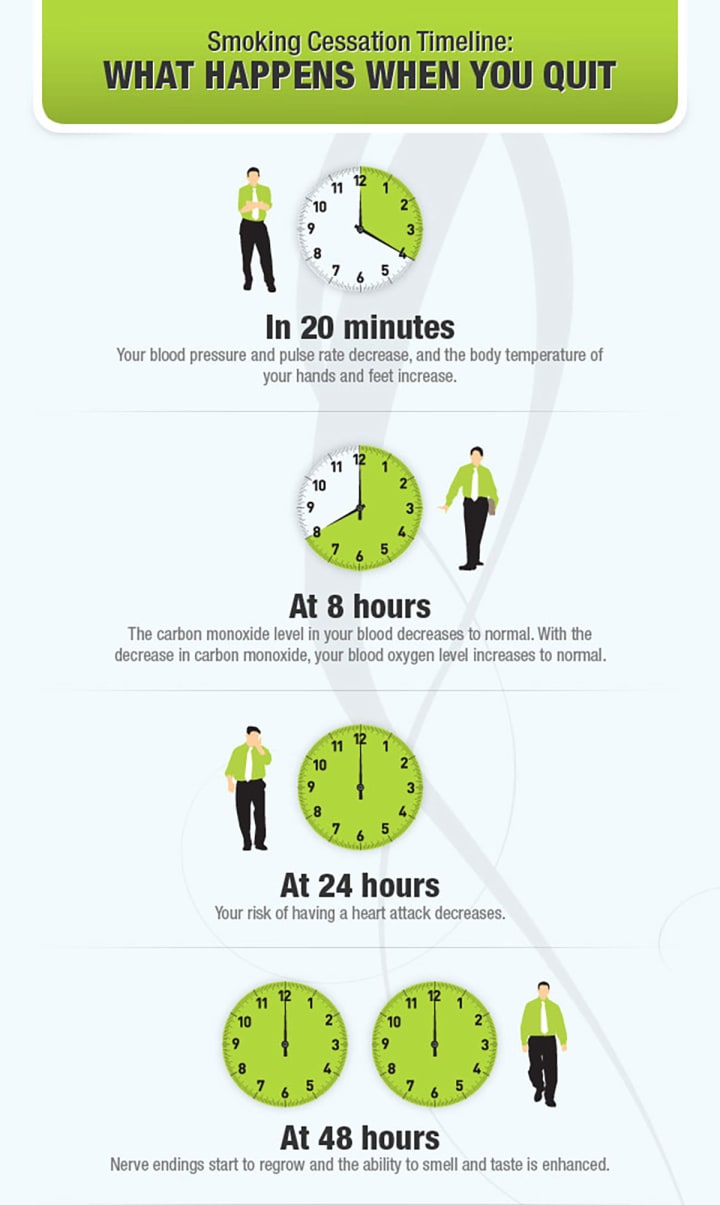How Does Smoking Affect Your Body?
It's clear that it is a terribly unhealthy habit, but exactly how does smoking affect your body?

According to the Center for Disease Control and Prevention (CDC), since 2005, smoking rates for adults in the United States has steady declined from 20.9 percent to 16.8 percent in 2014. This decline highlights the progress made in discouraging the habit, but currently, smoking is still prevalent, not only among adults but among adolescents, as well. The CDC further cited that in 2014, 12.7 percent of high school students and 3.1 percent of students in middle school were cigarette smokers.
Many people who become addicted to smoking usually start out as “casual” smokers, who smoke socially on occasion. They think very little of addiction since they are not smoking on a regular basis. The truth is, once an individual develops the habit, it becomes hard to kick. The nicotine in tobacco is highly addictive, and one in every three new smokers becomes addicted in the long run.
Smoking is the most common form of addiction in the US and is the source of several illnesses and disabilities. The CDC estimates that roughly 480,000 people die annually in the US from cigarette smoke, which is the leading cause of preventable death in America. Exactly how does smoking affect your body? Smoking is immensely harmful to the body and has the potential to affect every organ to a certain degree. There are many toxic compounds in tobacco that harms the body, including tar and carbon monoxide. Smoking generally diminishes the health of smokers, but more serious health issues can emerge that have an adverse effect on the brain, heart, lungs, digestive system, and oral health.
Brain

Image via Plaid Zebra
When a person smokes a cigarette, the inhaled chemicals travel to the brain. It only takes 10 seconds for nicotine to reach the brain where it remains active for up to 40 minutes. Smoking can harm the brain in two crucial ways, by thinning the cortex and by causing brain stroke. Research has revealed that smoking may cause brain damage as a result of the thinning of the cortex, the cortex is the outer portion of the brain where memory, language, and perception occurs. Essentially, it is the area responsible for cognition. Although aging itself thins the cortex, smoking appears to accelerate the process. A thinner cortex impairs the thought process, consequently leading to mental decline. Even if a person quits smoking, overtime, the cortex is only partially restored.
Cigarette smoking can also cause cerebral thrombosis, a brain stroke. Smoking cause excess buildup of waxy plaque deposits in the arteries which causes them to lose their elasticity or become blocked. The brain depends on these arteries connecting to the heart for a supply of oxygenated blood, and when they become blocked or shrink, preventing the free flow of blood to the brain, a stroke results. The risk of stroke greatly increases for a chronic smoker.
Heart

Image via inspiration room
Smoking in any quantity affects the heart and blood vessels, and makes an individual more likely to develop heart disease. Smoking increases heart rate, constricts major arteries, and can disrupt the rhythm of the heart, any of which forces the heart to work harder and increases the blood pressure. The function of the heart, as well as the function and structure of the blood vessels, becomes damaged from toxic smoke compounds. The presence of these compounds causes atherosclerosis, a disease in which the buildup of fatty plaque narrows and hardens the arteries, limiting the flow of oxygenated blood throughout the body. When the coronary arteries become damaged by plaque, this can result in such ailments as chest pain, heart attack, stroke, heart failure, arrhythmia, and at its worst, death. The danger of coronary heart disease increases with smoking as a single factor, but coupled with other risk factors, the risk of heart disease is amplified.
Lungs

Image via adeevee
The lungs are another organ in the body that cigarette smoking affects, creating a lot of breathing problems, from simple colds or chronic coughs, to severe illnesses. Many chemicals in cigarette smoke alter the lungs and interfere with the body’s process of cleaning the lungs. Smoking inflames the lungs, resulting in an increase in mucus that becomes thicker. The cilia, the lining of the airways that cleans out dirt and dust, ceases to function effectively, leading to congestion in the lungs due to the buildup of mucus and toxic substances.
Chronic bronchitis is a common illness that results from excess mucus in the lungs. The lining of the bronchial tube swells, diminishing capacity for air to circulate to and from the lungs. This inflammation of the air passage can also trigger asthma in smokers. Overtime, the lungs' structure is destroyed by the toxic chemicals absorbed which lead to more serious illnesses. The walls of the lungs deteriorate and cause emphysema, a condition in which the tissues of the lungs are greatly reduced, making it impossible for the transfer of oxygen from the air to the blood. The tissues are essentially destroyed and, as a result, it obstructs breathing. The tissues of the lungs cannot be repaired once damaged. The gravest of diseases would be lung cancer which many doctors believe occurs when the cells that line the lungs are destroyed. Smoking can affect the health of the lungs either in the short-term, gradually, or in the long-term, and the results can be mild to severe.
Mouth

Artwork by Thomas Saliot
If cigarette smoke can find its way to the lungs and cause damage, it certainly can affect the mouth which it comes in contact with first. Several oral diseases and conditions are caused by or are associated with smoking including, bad breath, smoker’s melanosis-brown spots inside the mouth, coated tongue, oral thrush, dental implant failure, and oral cancer, among others.
However, the most common condition among smokers is gum disease in which smoking interferes with the normal function of gum tissue cells. The risk of developing gum disease increases in smokers depending on the amount smoked and the period of smoking. The gums of a smoker exhibit less inflammation and bleeding because the blood vessels in the facial area constrict. Inflammation around the gums is not sufficient to examine the health of the gums in a smoker. The typical bacteria that are involved in gum disease, such as gingivitis, tends to be present in a higher quantity in smokers than in nonsmokers. Smoking causes more “bad” bacteria in smokers than nonsmokers, because it interferes with the body’s response to the bacteria in plaque which causes gum disease. Smokers generally do not heal at a fast pace following treatment for gum disease.
Digestive

Image via ivsky
Smoking can further affect changes within the digestive system which can cause many disorders, such as heartburn and gastroesophageal reflux disease (GERD), peptic ulcers, and even liver disease. The risk for gallstones, colon polyps, Crohn’s disease, and pancreatitis all increase in smokers. The digestive system is responsible for converting food into nutrients that the body can readily absorb and utilize. Any changes in the digestive system can affect its function, and therefore affects the body as a whole. Heartburn and GERD are the most common disorders that affect the digestive system. Heartburn occurs when the stomach acid backs up into the esophagus, where a valve at the lower end of the esophagus fails to keep the acid from leaving the stomach. Nicotine relaxes the valve, allowing stomach acid to flow backward into the esophagus causing a burning sensation: acid reflux. Reflux acid can damage the esophagus by injuring the lining, making it overly sensitive to acid. Prolonged GERD can result in bleeding ulcers in the esophagus, which narrows it, causing food to get stuck in the throat.
How to Quit

Image via BlendHappy
Undoubtedly, smoking can harm the body immensely causing many diseases. Many people become addicted to smoking, transitioning from adolescence into adulthood. Nicotine is highly addictive which makes it difficult for smokers to quit. However, quitting is not an impossible task, only a challenging one.
The first thing to do is to get motivated and establish reasons to quit. It may be to lower the risk of chronic diseases, or to reverse the signs of aging, or even to protect your child from secondhand smoking. Get serious about quitting and stay focus on why you are quitting. Nicotine replacement therapy is a great way to eliminate the smoking habit and manage the withdrawal symptoms when quitting cigarette. "Replacing" cigarettes with other nicotine substitutes, such as nicotine gum or a nicotine patch helps to curb the urges and helps with headaches, mood, and low energy generally associated with withdrawal. Non-nicotine prescription medications such as Chantix and Zyban are available for short-term use and helps reduce craving and withdrawal symptoms. After that last cigarette, the healing process begins, restoring damage done to the body. Any day is a good day to quit smoking. Quit and improve your overall health and quality of life.
About the Creator
James Porterson
Former obese teen turned nutritionist. Enjoys writing about staying active and proper nutrition.






Comments
There are no comments for this story
Be the first to respond and start the conversation.